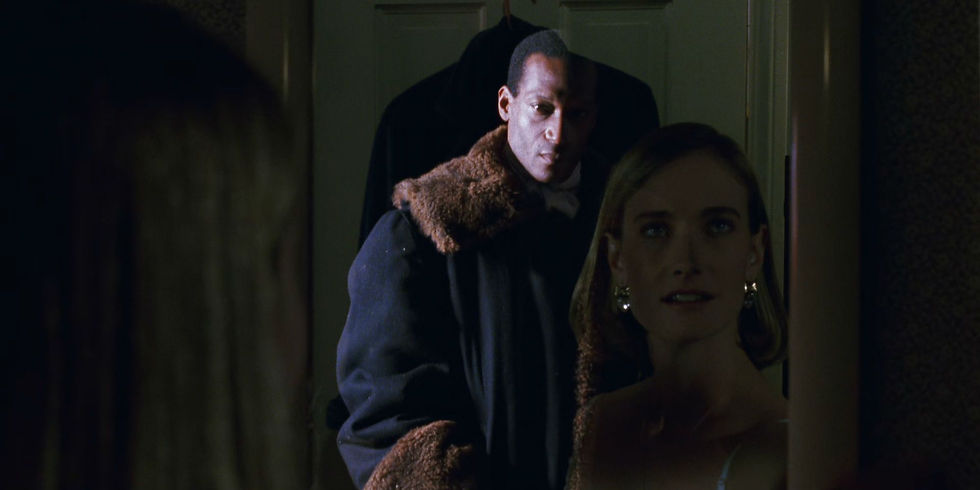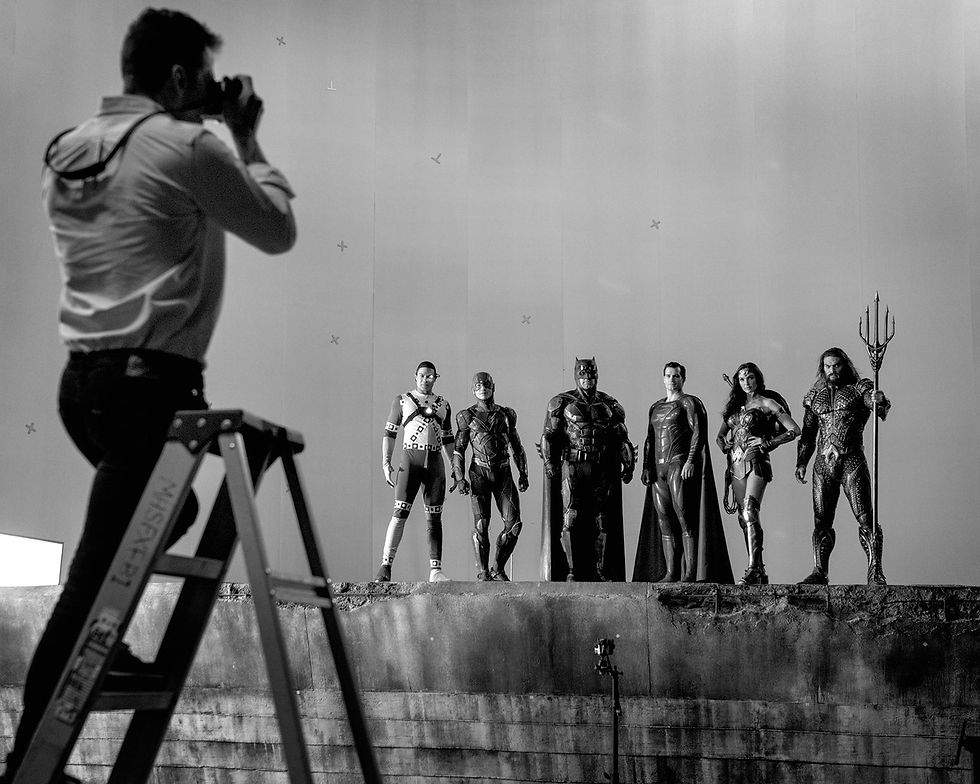Candyman- how white women survive in horror films
- Grace Davidson-Lynch

- Jun 29, 2020
- 6 min read
Even if you don’t watch a lot of horror, you probably know the stereotypes surrounding the portrayal of women.

You know about the topless, screaming white woman running through a haunted house or spooky forest, making stupid decisions and getting herself murdered, raped, mutilated, or all of the above. For those concerned with the bad politics of horror, this trope is a good one to reference when arguing that horror abuses stereotypes and plays into dark, masculine fantasies of domination and female prosecution. While I agree that there are probably too many naked screaming women in horror for me to feel comfortable with the trend, I don't think these portrayals should be banned entirely. It’s disingenuous to argue that violence against women doesn’t sometimes look like a woman being sexually brutalised. Horror doesn’t have to present an idealistic view of the world; actually, it’s quite the opposite.
There are ways to ‘fix’ this trope, and some have tried- maybe your woman is smart, or a virgin who doesn’t want to have sex with anyone, or maybe she’s not white, or straight. Maybe she's not even blonde. However, she is always a victim. When a woman is sexually brutalised and murdered on screen, she is good and the perpetrator is bad. And with victimhood comes a loss of agency. She didn’t have any options, her power was taken, and she was left vulnerable as a result. This lack of agency makes it easy for filmmakers and audiences to dismiss her other abilities. Sure, she might be a nuclear physicist, but if you show her with no shirt on, running and tripping through a house trying to outstrip her attacker, then her brains are for naught.
She is reduced to her body; how quickly she can run, how sexy she looks, and how much of her blood will be spilled.
But we know that women, like all people, are more complicated than a stereotype. How can horror explore these aspects of being a woman in peril, without discrediting her abilities or resorting to a victimhood narrative? I watched a film last week that centres on themes of racial inequality and institutionalised violence- what I found was also a fascinating deconstruction of white female privilege in horror cinema.
This is Candyman (1992).
Spoilers ahead- you have been warned…

Candyman is an enigmatic film. It’s ambiguous narrative makes it a difficult film to talk about with any level of confidence. There are plenty of openings in the story through which the themes of the film can be analysed, and everyone who watches it will understand it differently. Released in 1992, the film centres on grad student Helen and her research partner Bernadette, as they work on a thesis concerning urban myth and modern folklore. Candyman is one such myth, a combination of Bloody Mary and the Hookman, who haunts the residents of the Cabrini-Green housing project in Chicago.
I initially set out to watch this film for the character of the Candyman himself, played by Tony Todd. It is somewhat unique to feature a black man as the antagonist of a horror movie, and this aspect of the film has caused its own controversy. In a 1992 article for The Chicago Tribune, black director Carl Franklin is quoted as saying of the film-
"It's irresponsible and racist... it unabashedly uses racial stereotypes and destructive myths to create shock. I found it hokey and unsettling. It didn't work for me because I don`t share those fears, buy into those myths.''
It's a fair point to make- Candyman is 6'5'' black man who is sexually attracted to numerous white woman, and commits acts of violence designed to specifically hurt the black community of Cabrini-Green. The black community in turn are intensely suspicious and amorphous, and are able to accept the magical nature of Candyman with a level of readiness that implies either stupidity or otherworldliness. However, I am in no position to comment on this aspect of the film's depiction of race (though I certainly empathise with those opinions). I can, however, talk endlessly about the depiction of white womanhood in the film.
Following Helen's perspective as she is tortured by Candyman, it's easy to empathise with her plight and hope that she can beat the evil that has become attached to her. But the more I thought about the events of the film, the more sure I became that Helen was actually to blame for the horrors she was victimised by. Her status as brutalised screaming woman is one that she earns. This is a little politically scary, to say the least. Helen the victim of male-led violence got what she deserved?
Allow me to unpack the politics a little more.
When Helen and Bernadette go to Cabrini-Green to talk to the neighbours of a recent Candyman victim, they do so with a total lack of racial and moral sensitivity. The two women walk, hands in pockets and visibly nervous, through a group of black men hanging out near the bottom of the tower. The men follow them, asking what they want and if they are cops. The two women walk on briskly, clearly terrified. They go up the stairs, and Helen goes by herself into the abandoned flat where the murder occurred. I sat, watching this film, ready for the jump scares and horrors to begin, but then I thought about it.

Was she actually being stupid or reckless? Why was I so sure she was about to be hurt?
Because she was a white woman armed with only a camera, investigating an abandoned flat in a poor neighbourhood populated almost exclusively by people of colour?
Rationally, there is no reason she should be afraid. She breaks no laws, only transgressing some social boundaries about white and black folk keeping their distance. Isn’t it good to go and help those less fortunate than yourself? They aren’t bad people, and it’s racist to assume that they are. I thought back to the experience of watching Get Out, and how horror films can map violence and fear onto locations that naturally evoke stress. So, the assumption then is that the housing projects evoke fear in an audience. And then, as a nosy white woman myself, it’s only right that I ask the question-
Would I feel afraid if I were armed with only a camera, investigating an abandoned flat in a poor neighbourhood populated almost exclusively by people of colour?
It’s an uncomfortable question.
It was at this point I began to see the patterns emerging. Helen isn’t evil or outwardly racist, but she does exploit her position in society as a well-educated white person. She has a personal stake in Candyman, because she wants to get a book deal out of her experiences. She exploits her access and wiggles her way into the situation at Cabrini-Green without permission. She is explicitly told numerous times by the residents to keep out of it, but she ignores them.
Why does she discount their opinions? Why does she risk her own safety and pursue a line of study without permission?
Because she is a white woman armed with a camera. She doesn’t believe that bad things can happen to her.
Later in the film, it is revealed that Candyman became a hook-handed monster because he was lynched for impregnating a white woman. It’s a story that resonates in the annals of history and the injustices of today, but in a story like that there is very little condemnation felt by the woman. Candyman’s lover was consenting, but she was reckless. There is nothing wrong with falling in love with a black man, but as a white woman in the 19th century there is a level of risk associated.
Not because you will get hurt, but because your desires will lead to the harm of others.
This is not a problem with simple answers. Should Helen have ignored her hunch and let Candyman go? Wouldn’t that just lead to more death? Should Candyman’s lover have rebuked his advances to keep them both safe? Wouldn’t that have been cruel? Maybe these white women could have solved all the problems for their black allies, if only they had been allowed to do so.
But this argument assumes that a white woman, with no qualifications other than her empathy based in personal wants, can save the day by virtue of being white. Which is, of course, insane. But it’s a feeling that hangs over the film, and one that has hung over society for centuries.
Helen is punished for her actions through sexualised violence, but her friends and loved ones are punished too. Her sense of self is staggeringly egocentric. Her intelligence and empathy only extended as far as she needs them to in order to feel justified in her actions.
But the worst thing about Helen is that you identify with her for much longer than is reasonably comfortable.
She’s not the villain, but she is the cause of Candyman’s resurgence. And her white female privilege is part of that cause. In the end, as she takes on her own urban legend persona, Helen’s tragedy is mythologised alongside her indiscretions. She can become a new tool to teach those who hear her story about the dangers of meddling where you don’t belong, of trying to fix problems far greater than yourself single-handedly, and of only extending empathy for personal gain.
If you only take one thing away from this, just remember- you are allowed to say Candyman in the mirror five times. No one is going to stop you. You can do whatever you want, right?
But is that an ethical expression of your privilege?


What do you think? Leave your own musings in the comments- here, on Facebook, or LinkedIn...
References
Lovell, G 1992, 'Black slasher 'Candyman' draws fire over 'racist' depictions', The Chicago Tribunes, 29 October, viewed 26 June 2020, <https://www.chicagotribune.com/news/ct-xpm-1992-10-29-9204080203-story.html>.
Images
Film stills © TriStar Pictures



Comments